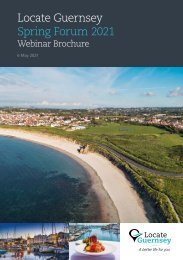En Voyage_Issue#11_Flickbook
You also want an ePaper? Increase the reach of your titles
YUMPU automatically turns print PDFs into web optimized ePapers that Google loves.
Business<br />
WHO GETS<br />
THE DOG?<br />
ADVOCATE ADRIAN BROWN,<br />
PARTNER AT BROWNS ADVOCATES,<br />
DISCUSSES DIVISION OF ASSETS ON DIVORCE.<br />
Unless you have been living on<br />
another planet for the past few<br />
months you will be aware that Ant<br />
McPartlin, one half of the television<br />
duo Ant & Dec, and his wife<br />
Lisa Armstrong are sadly getting<br />
divorced. One perhaps lesser<br />
known aspect of their divorce is<br />
who will have custody of their<br />
beloved Labrador, Hurley. Reports<br />
have it that custody of Hurley is<br />
likely to be shared, but how do<br />
Courts make decisions regarding<br />
pets on divorce and generally<br />
what are the rules concerning<br />
division of assets on separation?<br />
The first rule is that there are<br />
few hard and fast rules. The law<br />
relating to division of assets on<br />
divorce is fairly complex and<br />
sometimes difficult to predict.<br />
One of the main reasons for<br />
this is that the Court has a very<br />
wide discretion when deciding<br />
who gets what. The guiding<br />
principle is fairness but fairness<br />
of course is highly subjective.<br />
What may seem fair to one party<br />
may not be the same for the<br />
other. What we do know is that<br />
fairness does not necessarily<br />
mean an equal division. The<br />
parties must be left in a position<br />
of comparable standing and<br />
there must be no discrimination<br />
between the respective roles of<br />
breadwinner and homemaker,<br />
which are regarded as equal.<br />
Guernsey divorce law dates back<br />
to 1939 and simply vests power<br />
in the Royal Court to divide the<br />
assets between the parties. By<br />
custom, Guernsey has adopted<br />
the principles of <strong>En</strong>glish divorce<br />
law which provides a series of<br />
factors to be taken into account.<br />
First consideration must always<br />
be given to the needs of the<br />
dependent children. In practical<br />
terms, this usually means that<br />
accommodation should, if<br />
possible, be provided for the<br />
children and the custodial parent.<br />
In some cases, this will require<br />
the custodial parent to retain the<br />
matrimonial home and in other<br />
cases the property will need to be<br />
sold. Ideally if the available assets<br />
permit, the Court will always look<br />
to accommodate both parties.<br />
THE PARTIES MUST BE<br />
LEFT IN A POSITION OF<br />
COMPARABLE STANDING<br />
AND THERE MUST BE<br />
NO DISCRIMINATION<br />
BETWEEN THE<br />
RESPECTIVE ROLES OF<br />
BREADWINNER AND<br />
HOMEMAKER, WHICH ARE<br />
REGARDED AS EQUAL<br />
The starting point is an equal<br />
division of the assets. The Court<br />
will then consider a list of factors<br />
including the incomes and<br />
financial resources of each party,<br />
their needs, the standard of living<br />
enjoyed by the family, the age of<br />
each party and the duration of the<br />
marriage. This list is not exhaustive<br />
and ultimately the Court will take<br />
into account all the circumstances<br />
which it regards to be relevant.<br />
Pulling together these strands<br />
can be a difficult exercise which<br />
is where judicial discretion comes<br />
into play. Dividing the assets in<br />
such a way so as to create and<br />
maintain two households is<br />
often a difficult task, especially<br />
where the assets are limited<br />
and particularly so in Guernsey<br />
where housing costs are high.<br />
In other cases where the<br />
available resources exceed the<br />
immediate accommodation needs<br />
of each party, the Court can<br />
consider dividing the remaining<br />
assets relevant to their origin. This<br />
can involve splitting resources into<br />
matrimonial and non-matrimonial<br />
property, the distinction being<br />
that matrimonial assets are<br />
acquired during the course of<br />
the marriage by joint enterprise,<br />
whereas non-matrimonial<br />
assets generally accrue outside<br />
the marriage either by way of<br />
inheritance, family gift or preowned<br />
property. These types of<br />
cases can become complex but as<br />
before the ultimate test is fairness.<br />
Most divorce settlements are<br />
structured on the basis of a clean<br />
break financial settlement so that<br />
other than child maintenance,<br />
there are no ongoing financial<br />
links between the parties. In<br />
that way, both parties can move<br />
on with their lives financially<br />
independent of the other.<br />
So, what about the dog? Pets<br />
are always an emotive subject<br />
on divorce. For some they are<br />
surrogate children and are thought<br />
of with great love and affection.<br />
Whilst it may seem a little harsh,<br />
the answer is that legally a pet is<br />
considered to be a chattel and is<br />
dealt with in just the same way<br />
as the car, contents or cash. The<br />
Courts will not usually make a<br />
decision regarding who gets<br />
custody of the dog in just the<br />
same way that a Court will not<br />
divide the crockery. That does<br />
not mean to say it could not<br />
happen, but the fact that there<br />
are no reported decisions on<br />
custody of pets in Guernsey<br />
or the UK tells its own story.<br />
So, as Hurley’s future custody<br />
hangs by a thread, one hopes<br />
that Mr and Mrs McPartlin can<br />
agree shared care without<br />
having to trouble the Courts.<br />
81
















